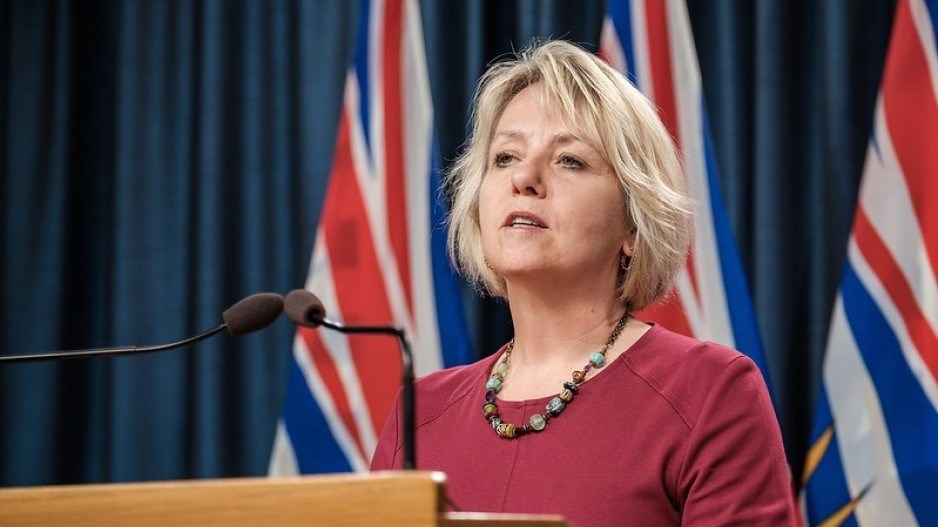Provincial health officer Dr. Bonnie Henry says there should be a “low threshold” for keeping kids home and away from school – a matter that’s raising concern with a school advocacy group.
B.C.'s top doc does not include congestion and runny nose on an official list of COVID-19 symptoms students should monitor in determining if they should be tested.
This week, Henry twice spoke publicly on the matter of isolating sick children from school.
“If they have symptoms, keep them at home. And for everybody who’s vaccinated, for everybody we’re really looking at that five-day [isolation] period,” said Henry on Monday at a televised town hall with Health Minister Adrian Dix.
“But for children it can be really mild, and if it’s mild and it goes away in one or two days, then they’re fine to go back to school.”
Asked by media on Tuesday at a press conference, Henry reiterated, “I think what we need to have is a low threshold for keeping kids home.
“A little bit of a running nose and a cough, sometimes it’s hard to know,” said Henry.
The B.C. Ministry of Health did not respond to Glacier Media for clarity on the matter.
The B.C. Centre for Disease Control (BCCDC) updated its guidelines for seeking testing on Jan. 6, amid surging demand outpacing low supplies of publicly available testing and testing centre closures.
The centre says a person should get tested and stay home if they have one of the following symptoms: fever above 38 C; loss of taste or smell; chills; cough; difficulty breathing. If they have one of the following symptoms, they are asked to stay home until they feel better, or, if they have two, then they should seek a test if the symptoms do not resolve in 24 hours: sore throat; loss of appetite; extreme fatigue; headache; nausea or vomiting; body aches; diarrhea.
These guidelines run contrary to reported findings of symptoms of the Omicron COVID-19 variant.
An analysis by King’s College London using a U.K. symptom tracker and reported by TheConversation.com “showed no significant difference in the overall symptom profile of Delta and Omicron, with the top five symptoms in both time periods being a runny nose, headache, fatigue, sneezing and a sore throat.”
Furthermore, the loss of taste and smell is being less reported with Omicron infections.
Dr. Andy Pekosz, a virologist at the Johns Hopkins Bloomberg School of Public Health, stated similar findings to Business Insider this week.
And the U.S. CDC continues to list congestion as a symptom.
It’s unclear why Henry would omit runny nose from a list of symptoms.
Jennifer Heighton, a Burnaby elementary school teacher and advocate with Safe Schools Coalition BC (SSC), theorizes Henry’s policies are driven by economics over public health.
“They’re almost encouraging it to happen out of convenience. I think it sounds like she’s worried about them missing school and parents needing to stay home,” she says. “We at SSC do not feel economics should not be driving conditions; it should be safety of students, family and staff before economics.”
Heighton’s group has demanded immediate air ventilation upgrades in schools, testing and tracing in schools, quicker vaccinations and respirator masks for all students.
The BCCDC notes if a child is a close contact of a COVID-19-positive person they must isolate for 10 days (since no child in B.C. is fully vaccinated and such is the requirement for unvaccinated close contacts).
No firm numbers are available yet, but student attendance is reported to be slightly below normal across the board for B.C. schools resuming classes this week after the holiday break.
“We’ll have a better sense, a much clearer picture over the next couple of days,” Education Minister Jennifer Whiteside said Tuesday.
Some parents have said they won’t be sending their children to school while COVID-19 cases remain high. Others who are sending their kids are worried about transmission as close to 600,000 students returned to class Monday.
COVID-19 hospitalizations in B.C. Wednesday surged to 500 — the highest count since April 30, and only 15 away from an all-time record.
With a file from Jeff Bell, Times Colonist




